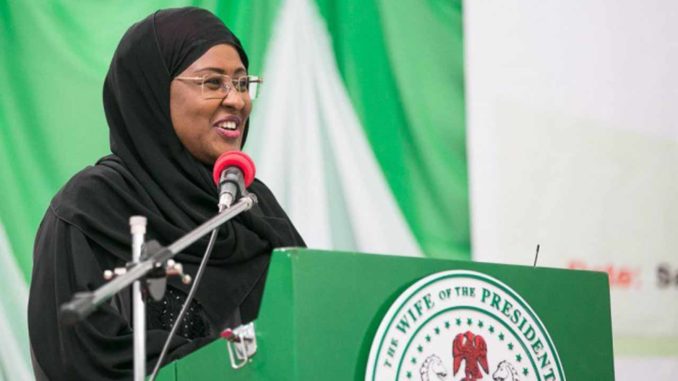
Over the years, the office of the First lady, at both federal and state levels, has gained immeasurable recognition and appreciation in the country such that any move aimed at formalising it now will, rather than enhance its standing, only increase the country bureaucratic red-tapism. Indeed, that office is already an institution, having regard to what it has been able to achieve in the course of the nation’s development. A formal recognition now will add little to the office’s present standing. The call for a formal accommodation of that office, made recently by the wife of the president and those of the 36 state governors is therefore unnecessary.
It is no news that the nation is economically hurting, prompting government’s persistent borrowing to fund its budget deficits, the vast majority of which is apportioned to recurrent expenditure. This is one of the reasons stakeholders have repeatedly called for restructuring of most government parastatals as a means of addressing the burgeoning cost of governance. The time is certainly inauspicious for advocating a formal recognition of the office of the first lady.
Nigeria’s First Lady, Aisha Buhari, and the wives of the 36 states’ governors lately canvassed policy and administrative measures at the national and state levels to formally accommodate the existence of the office of wife of the president and wives of governors as a complement to inclusive governance.
Their position was highlighted in a communiqué issued at the end of a summit on “Emerging Trends in the Role of the First Lady in National Development”, organised by the Office of the First Lady of Nigeria, in collaboration with Women and National Development (WAND) in Abuja. The summit said despite limitations, first ladies in Nigeria had contributed significantly to national development. It said Nigeria needed to move with the time and formally acknowledge the critical role of the first ladies.
The institution of the First Ladyship has found its way into Nigeria’s political landscape, introduced by the late wife of former head of State, Gen. Ibrahim Babangida, Maryam, developed and evolved over the course of the country’s democratic voyage depending on the personality of the respective occupant. However, the office of the First Lady, having not been supported by any statute, remains ceremonial and rightly so.
It is customary for First Ladies to adopt a specific social cause to promote, usually termed “pet project” which the wife of the president and governors of the 36 State now see as trivializing the importance of their initiatives. Indeed, the contributions of First Ladies to the development of the society particularly in the areas of social/community development, health, education, and gender-based violence cannot be underplayed.
For instance, the initiative of Mrs. Buhari, Future Assured, which is centred on health advocacy, women and youth empowerment is said to have trained over 5000 women in revenue generating activities to make them self-reliant. Wife of the Governor of Lagos State, Dr. Ibijoke Sanwolu is known for her posture against gender-based violence. Wife of Delta State Governor, Dame Edith Okowa is known for her 05 Initiative, which has delivered 15 sickle cell clinics to the state.
In spite of the strides by these first ladies, the country must be careful how far the envelope is pushed for the institutionalization of the office of the First Lady, lest she makes a mockery of her system of governance. While the office of First Lady may not have been constitutionally recognised, it is an open secret that governments over the years have built infrastructures to accommodate this contraption. In fact, the pension laws for former governors of most states surreptitiously provides for the welfare of wives of former governors. A case in point is that of Akwa Ibom State, which entitles Widows of former governors to N12 million a year, while those of deputy governors would get N6 million.
The idea of using scarce state fund to prop the First ladies office is not sustainable and must not be encouraged. Wives of governors/executives can do well to support the political activities of their spouses but same should not be at the expense of state resources. The institutionalization of the Office of the first lady will only serve as another drain duct on the state resources. In the case of a governor whose custom or religious practice admits of polygamy what then becomes of the office? What happens in cases where the lady is the elected official?
It is ironic that the wife of the President is the champion for the course, even though President Buhari during his presidential campaign in 2014, assured Nigerians that he would not retain the office of the First Lady as same is not constitutionally provided for, and in her reaction Mrs. Aisha Buhari was quoted to have said “If the office of the first lady is constitutionally recognised, he (President Buhari) will not tamper with it, but if it is not that’s okay. For me, I will perform my duties and role as the wife of the President of Nigeria traditionally.”
There are reports however that the office of the wife of the president and that of the vice president have been assigned no less than ten Special Assistants whose remuneration is being borne by the State since the birth of the current administration. This is sad, but most other promises made by the current administration have similarly not been kept.
Traditionally, wives of elected officials bear a lot of goodwill, which is usually channelled to drive social development initiatives for the overall benefit of the society. However, this can be done without the need for their inclusion in some formal legislation. They should realise that while they are not acknowledged in the Constitution, they are nevertheless the power behind the throne.
END

Be the first to comment